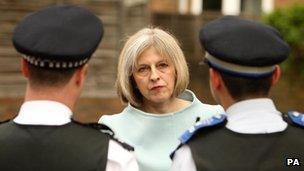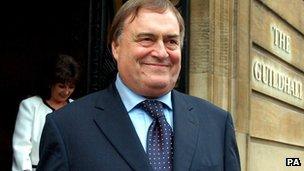Can politics and policing work together?
- Published
- comments

The home secretary is shaking up police structures
The point of police and crime commissioners, we are told, is to increase the democratic accountability of the 41 police forces in England and Wales outside London.
Ministers felt police authorities were not sufficiently responsive to the demands of an anxious citizenry. Chief constables needed someone with electoral clout to connect them to the people, to keep them honest.
Elections will be held in November and the first potential candidates are emerging. The concern, however, is that this American-inspired model of police accountability may not translate easily into English or Welsh.
The principles enshrined by the father of our modern police force, Sir Robert Peel, external, are to be found in the General Instructions given to the first Metropolitan Police officers in 1829.
Number five of nine states that it is the duty of officers "to seek and preserve public favour, not by pandering to public opinion; but by constantly demonstrating absolutely impartial service to law, in complete independence of policy, and without regard to the justice or injustice of the substance of individual laws, by ready offering of individual service and friendship to all members of the public without regard to their wealth or social standing".
British tradition has it that, to retain its legitimacy, the police service cannot allow itself to be politicised. Accountable, yes. Political, never.
Former chief constable Tim Brain and Lord Prescott debate the need for elected police commissioners
So here's the dilemma. How can you increase the democratic influence upon chief constables without undermining their independence?
The government's answer is to separate the strategic from the operational, with a layer of oversight to make sure it happens that way. Commissioners will formulate the policing plan, leaving chief constables to decide how best to achieve it with a panel of local politicians and lay members to ensure fair play.
But many police leaders remain profoundly uneasy about what will happen in practice. "All chief constables are quite cautious as we go into this period," says Sara Thornton, vice-president of the Association of Chief Police Officers and head of Thames Valley.
It now appears certain that elections for commissioners next November will include candidates badged to political parties. Former Labour ministers have said they will stand and some Conservatives look set to campaign on a Tory ticket.
Democracy and political tribalism are so intertwined in the UK that hopes the elections could be conducted in a non-partisan, practical, grassroots way have been dashed. Although independents will fight for votes, they fear party machines will crush all but the most well-known local candidates.
This has led to even greater anxiety that the huge constituencies - some well over two and a half million souls - will see their police priorities influenced by the core voters from the political heartlands of a successful party candidate.
The neighbourhoods where people are least likely to vote are the same communities with the greatest risk of crime. If democratic accountability is about reflecting the views of those who vote, independent policing is about protecting the lives of those who do not.
Will the checks and balances of the system ensure their needs are not ignored? And what happens when the commissioner's democratic mandate clashes with the chief constable's independent principle?

Former Hull MP Lord Prescott hopes to be elected police commissioner in his old constituency
And is there a risk commissioners might ignore the needs of those who didn't vote for them? The architect of this new model, Tory peer Lord Wasserman, thinks not.
"If anybody ignores great chunks of their community and allows crime in particular council estates where there are very few voters to rise, I think he will be exposed and he will be hammered," he tells me.
Who by?
"I'm relying on the community activists, I'm relying on the media, but I'm relying on far more than that. I'm relying on the community, and I want the community to feel that it has a role to play, and I think this will happen."
That, perhaps, is the real question posed by the introduction of police and crime commissioners. Is our local democracy good enough to keep them honest?
So what do you think? Take part in the debate on Twitter, using the hashtag #whatarepolicefor, external.
Catch up with Mark's three-part series What Are The Police For for BBC Radio 4 on iPlayer